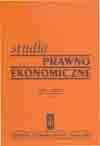Burke v. Hume – problem prawa natury u początków brytyjskiego konserwatyzmu
Burke v. Hume – the problem of the natural law at the beginning of British conservatism
Author(s): Tomasz TulejskiSubject(s): Law, Constitution, Jurisprudence
Published by: Łódzkie Towarzystwo Naukowe
Keywords: conservatism; Hume; Burke; natural law
Summary/Abstract: The Author presents two different currents in Anglo-Saxon conservative political philosophy. He argues that their founders – David Hume and Edmund Burke – represent completely different approaches toward the issue of natural law. For Hume, the natural law is nothing but the product of social practices. It is changeable and evolves together with society itself. In turn, Burke appeals to the conception of natural law in its classical version. For him, it is universal, commonly binding and immutable. It constitutes the main source of the legitimacy of all social and political institutions. The Author indicates that it is the reason why it is appropriate to consider these two conceptions of natural law separately. The former accepts slow, evolutionary changes regardless of their direction. The latter assumes that they are bound to be correlated with the natural law order.
Journal: Studia Prawno-Ekonomiczne
- Issue Year: 2013
- Issue No: 89
- Page Range: 155-170
- Page Count: 16
- Language: Polish

